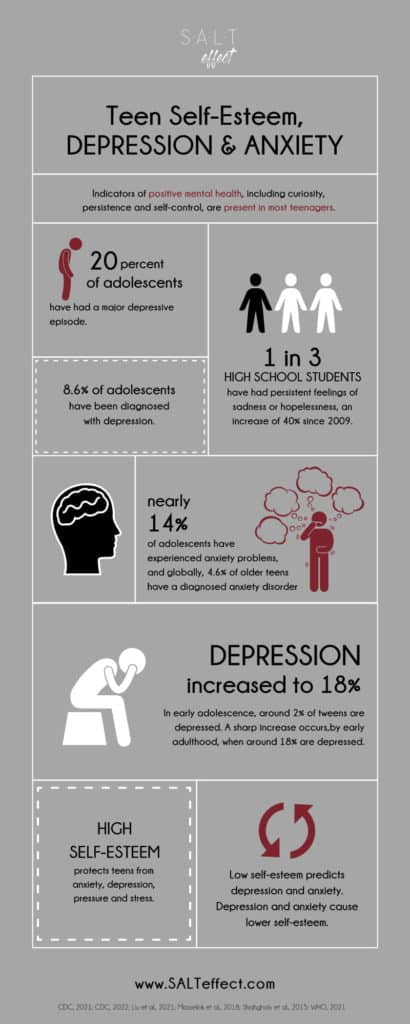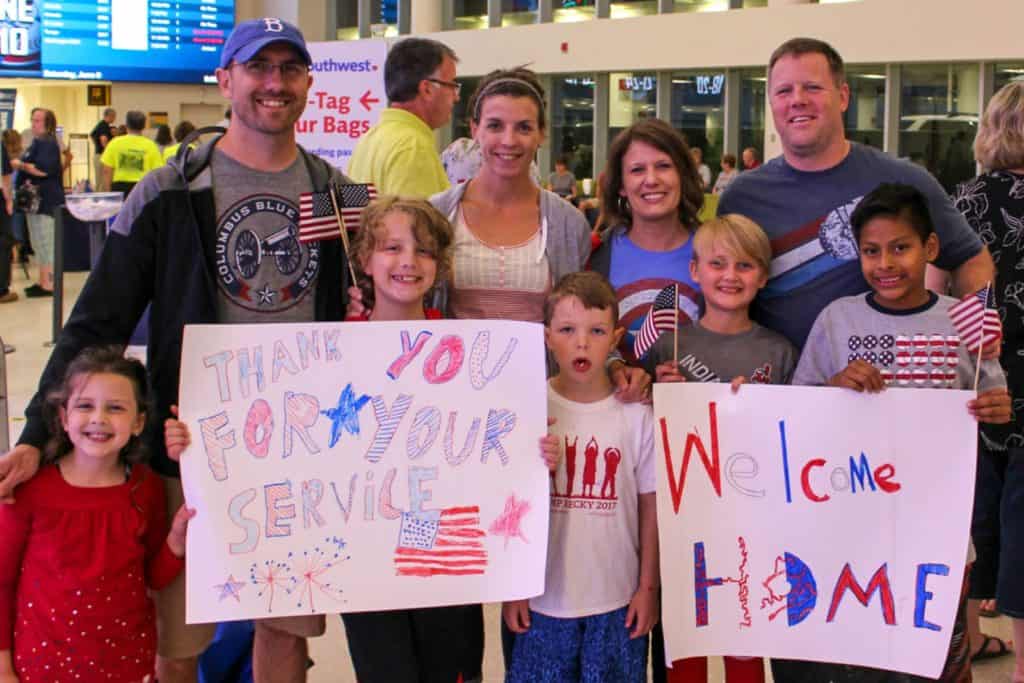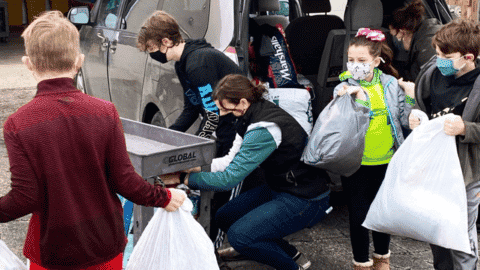7 Proven Strategies to Help Kids Overcome Stress and Setbacks

Over many years of teaching both confident and struggling college students (and raising tweens and teen), we’ve learned 7 actionable strategies to help kids manage stress, build resilience and navigate the challenges of growing up in today’s world.
Today’s Kids Are Growing Up in an Anxious World
We are in the midst of a mental health crisis.
The statistics I gathered for 101+ Teen Self-Esteem Statistics were sobering:
20% of adolescents have had a major depressive episode and nearly 14% have experienced anxiety problems.
CDC


It has absolutely nothing to do with the content of my class, but it just might be the most important 15 minutes over the 15 weeks of the semester.
The Most important 15 minutes of every semester
This is what I tell them:
You must take care of yourselves. Life is bigger than your grades and assignments and the stress of college. And you’ll never again be somewhere with access to more free resources and people who are invested in your success.
You need to develop resilience and grit. To do that, you need to be physically, mentally, and spiritually healthy. Talk to someone. Take advantage of counseling and wellness coaching and suicide prevention. If you don’t need any of that right now, pass it along to your friends who do.
I care about you first. Your work in this class is secondary. My door is always open and you can email me anytime. College life is overwhelming and hard and stressful.
I wish I could tell you that it gets better, but the reality is that life is often difficult, and terrible things happen. You need to figure out how to push through it with resilience and grit. So communicate with people you care about and get help when you need it.
READ MORE >>>> Proven Self-Care Tips to Boost Well-Being in Students
A week after this conversation in class, I received an email from one of my students asking some questions about campus counseling sessions and thanking me for taking time to talk about it.
If this semester is like previous ones, I’ll have several students in my office over the coming weeks who ask for help or end up in tears because I asked one more question than other instructors, friends or family have.
I don’t give them the option of glossing over what’s happening in their life. I don’t ask for details, but I do ask how they are.
Without fail, my 15-minute focus on mental health is referenced by multiple students in their final reflection papers and official evaluations of my course. It surprises me every time because something that required so little of me has such a strong impact on them. Why?
All I did was talk to them and care about them. I learned who they were and I asked questions. That’s it. And we have the same ability to do this as parents.
Communication is Key to Raising Resilient Kids
Mary spends a tremendous amount of time building relationships with her students beyond the classroom as a mentor. She’s an award-winning teacher and often hears from students about how much she’s helped them – and a lot of that ties back to keeping a pulse with a quick text messages or emails, or longer chats over coffee or lunch.
What we do isn’t magic. It’s good communication.
That’s the key.

Mary takes a group of students to NYC every year for a networking trip.

We love supporting our student athletes too! Lauren and Maddy invited us to be special guests for their senior day field hockey game.
Communication. It’s mentioned – in some form – in everything I’ve read and heard about mental health:
- To end the stigma around mental illness, we need to be willing to talk about it.
- If you worry your kids are feeling depressed or anxious, tell their doctor.
- When we notice changes in a loved one that concern us, we need to start a conversation.
We can’t remove all obstacles our kids will encounter, and we can’t promise them a life free of crisis or pain.
So when we wonder what we should be doing with our kids right now to equip them to take on life with the right attitude and skills, the place to start is with healthy communication.
Why Healthy Communication is so powerful
“Researchers agree that clear, open, and frequent communication is a basic characteristic of a strong, healthy family. It’s an essential building block of strong marital, parent-child, and sibling relationships. Poor family communication can lead to numerous family problems, including excessive family conflict, ineffective problem solving, lack of intimacy, and weak emotional bonding. Poor communication is also associated with an increased risk of divorce and marital separation and more behavioral problems in children.”
Virginia Tech professor Rick Peterson,
Take a minute to reread that quote.
Healthy communication is incredibly powerful. When we prioritize and harness it, we can have a lasting impact on our kids.
Mary and I want to be proactive in this time of mental health crisis. We tell our college students that they need to build resilience, so we should make this a priority with our own kids. It won’t prevent or solve everything, but it will give our kids a solid foundation.
We want to raise resilient kids who are healthy communicators. But how?
7 Key Traits of Resilience
Researchers at the International Youth Foundation as well as Dr. Ken Ginsburg, a pediatrician, professor, and author, developed a model called “The 7 Cs: Building Blocks of Resilience.” It identifies the key characteristics of youth who positively contributed to society.
We read it and said, “Yes! That’s what we see in our college classrooms every day. You’re right on point.”
Communication isn’t officially one of the “Cs,” but we think it’s the secret sauce that helps you build these “Cs” in kids:
- Competence
- Confidence
- Connection
- Character
- Contribution
- Coping
- Control
1. Competence
Kids become competent only by experience. They learn how to trust their judgment and make responsible choices by DOING (this includes succeeding AND failing).
How to help your kids build competence
Take an honest look at your kids’ strengths. Identify and talk about them with your kids so they can develop those strengths.
Mary and I are strong advocates of Gallup strengths. My husband is certified in strengths coaching because it was a focus of his doctoral program in higher education–where Don Clifton, father of strengths psychology, was a professor. We love Strengths Based Parenting for help in cultivating our kids’ strengths.
Try to turn a lecture into a conversation about the issue. We know this can be really hard!
The next time you realize you’re lecturing your kids, stop yourself and commit to really listening to their perspective. Clarify your own points and give your kids a chance to take ownership of their actions.
Don’t pave the way or protect your kids from every failure. We’ve seen the result of helicopter and lawnmower parenting in our college students and it’s not pretty.
I LOVE this suggestion from Sara Blakely, the founder and CEO of Spanx. Instead of highs and lows at dinner, try this! We’ve had some great conversations with our boys after asking this question:
2. Confidence
Kids develop confidence when they learn how to cope with challenges and try out new things on their own.
How to help your kids build confidence
Focus more on character than achievements. Talk to your kids about the personal qualities you want to see in them (persistence, integrity, kindness), and start putting greater emphasis on those qualities.
Set realistic expectations. Sit down with your kids and help them establish a few goals that are just out of their reach (instead of goals that are too easy or too hard).
Don’t confuse confidence with the false self-esteem that results from only telling kids they are special and precious.
READ MORE >>>> 51 Self-Esteem Activities for Teens That Really Work
Mary’s son wanted to run a 5K. He had to stop and walk a few times, but he finished! Gold star for setting and meeting a goal!
3. Connection
Close ties to parents and family provide security and strong values that help prevent destructive behaviors. Kids also develop a sense of belonging through connections to civic, educational, religious, and athletic groups.
I played softball all the way through high school and it’s fun to stay in touch with many girls on Facebook, all these years later. (Glad I am no longer subject to giant glasses and grandma’s perms!)

My family spent Christmas week with my mom and brother’s family in Charleston to celebrate her 70th birthday. We all felt ridiculous walking around the beach in our matching handmade pjs, but those are the unique points of connection that make the best stories and memories!
How to help your kids build connection
Take an honest look at whether your family deals with conflict in a healthy way. Talk to your kids about the importance of resolving problems by addressing them directly and talking through them together.
This may result in awkward apologies and strained conversations with both friends and strangers, but it’s ALWAYS worth it.
Make sure, at the end of the day, your kids know beyond a doubt that you love them unconditionally. Make a habit of telling them how much you love them, and reassuring them that you won’t give up on them even when life gets hard or they make bad decisions.
Don’t take the challenges of parenting too personally as your kids move toward independence. You WILL get major sass, eye rolls, tears and slammed doors through the years. That doesn’t mean you’re doing it wrong or damaging your kids.
READ MORE >>>> 63 Funny & Inspirational Parenting Teenager Quotes
4. Character
Kids have a fundamental sense of right and wrong. With guidance, they can learn to make wise choices, contribute to the world, stick to their own values and become stable adults.
One of the phrases that I use to guide my own parenting is: Your character matters more to me than your happiness.
At first glance, that may sound heartless or that I don’t care about my kids being happy. Not true – although they’ve accused me of that plenty of times. I care a lot about the kind of people they are and their moral compass. When those things are prioritized, happiness and more importantly, joy, will come.
How to help your kids build character
Talk to your kids about how their behavior affects other people in good and bad ways.
Model what you want them to do. Explain to them how you take the needs of others into consideration when you make decisions.
Ask your kids if they see themselves as caring people. If this isn’t how they would describe themselves, point out times when you see them caring for others in big and small ways.
Avoid satisfying your kids’ need for immediate gratification. In our everything-on-demand world, this is really, really hard. It’s easier to make them happy than work to build their character. If you tend to give them what they want, start small and build from there.
5. Contribution
When kids see the importance of their contributions, they gain a sense of purpose and they realize the world is a better place because they’re in it. They take actions and make choices that improve the world.
How to help kids contribute
Instill a sense of gratitude in your kid. Talk to your kids about differences in money, freedom, and security so they understand that not everyone has what they need. Grab our Gratitude Photo Scavenger Hunt for a fun and easy way to be more grateful.

Serve and volunteer with your kids. Spend time talking about the importance of giving back and model generosity with your time and resources. We’ve gathered 117 Ideas for Volunteering with Your Family to make it as easy as possible for you!


Don’t assume your kids will give and serve generously if they don’t see you modeling it for them or making time for it. We know how easy it is to have good intentions…but then never really follow through. We started SALT effect to help parents – the Serving And Learning effect doesn’t take much to have an impact.
6. Coping
Kids learn how to manage stress and overcome challenges with positive, adaptive coping strategies instead of dangerous negative behaviors. After years of teaching and talking with parents, we wrote this helpful guide: Best Coping Skills for Teens: How to Manage Stress and Emotions.
How to help your kids build coping skills
Find out whether your kids know the difference between a crisis and a minor setback. Ask them about recent situations and help them differentiate between serious situations and things that just feel like an emergency in the moment.
Consider your own natural response to stressful situations (especially when you’re tired or overwhelmed). Talk with your kids about how they can approach situations with step-by-step problem solving.
Model healthy coping behaviors like exercise, nutrition, relaxation techniques and adequate sleep. To be honest, knowing that my kids pay attention to what I do (even more than what I say) helps me be more intentional about my choices.
7. Control
Kids know they have internal control when they realize that their choices and actions determine the results. We’re big fans of E+R=O — the idea that you can’t always control an Event, but you can control your Response, and that’s half of what creates a certain Outcome.
How to help your kids develop control
Reward your kids with increased privileges when they show responsibility. Ask them how they show responsibility, and then talk through some possible privileges that you might extend to them.
Talk to your kids about the difference between events that are and aren’t under their control. Discuss the differences and how positive and protective behaviors can help even when they can’t control a situation.
Look for teachable moments to show kids that actions produce consequences. I’ve found that watching tv shows or movies with my kids provides great opportunities for these discussions.










